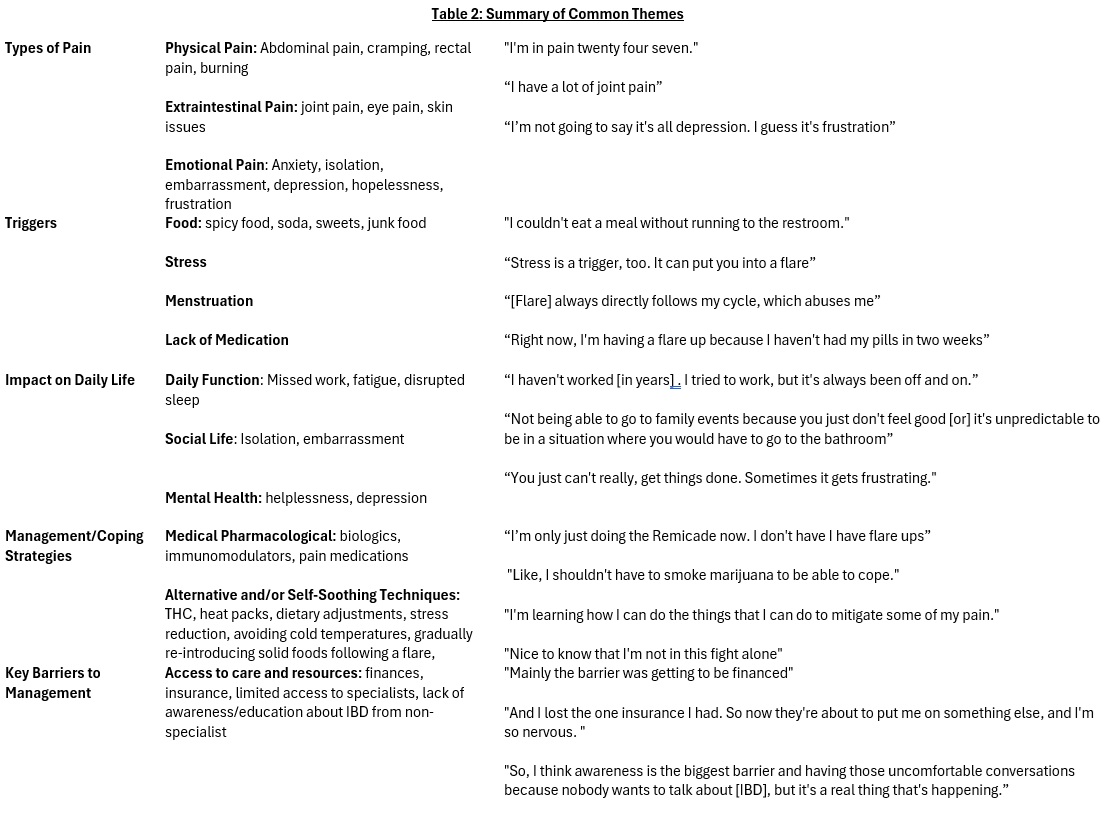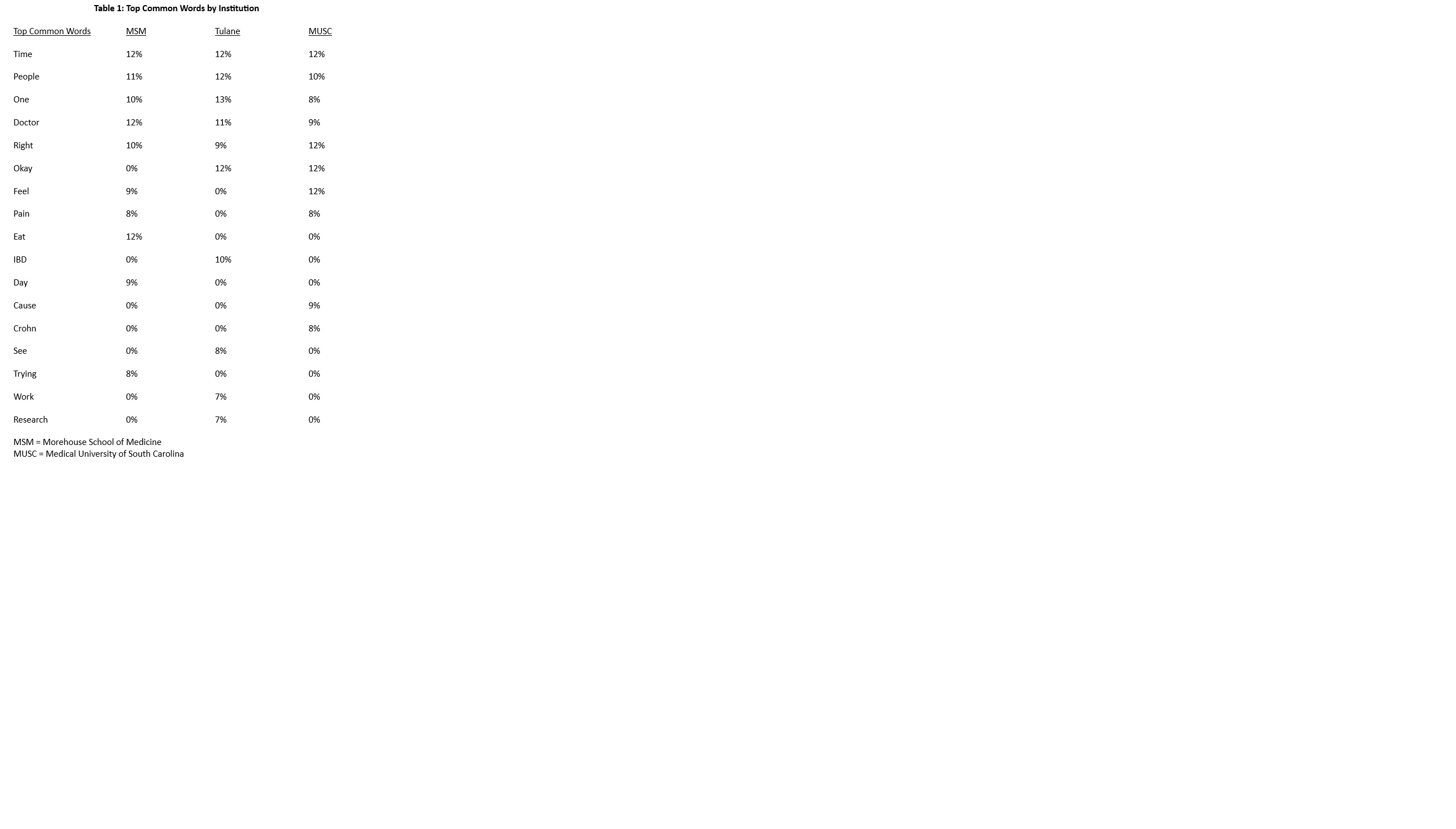Sunday Poster Session
Category: IBD
P1063 - IBD Care for Patients of Color: A Multi-Site Qualitative Analysis
Sunday, October 26, 2025
3:30 PM - 7:00 PM PDT
Location: Exhibit Hall
- BX
Brian Xu, MD
Morehouse School of Medicine
Atlanta, GA
Presenting Author(s)
Brian Xu, MD1, Chimsom Agbim, MD1, Daniela Ortega-Santori, MD1, Kingsley Njoku, MD1, Bo Wen, PhD2, Kely Norel, PhD2, Julia Liu, MD1
1Morehouse School of Medicine, Atlanta, GA; 2IBM, Atlanta, GA
Introduction: The global disease burden of Inflammatory Bowel Disease (IBD is rising. Black patients have shown more severe phenotypes and are more likely to be hospitalized. Evidence suggests minority patients face additional barriers to management including affordability of and access to care. The aim of this study was to assess IBD PoC’s perspectives regarding their disease management, goals of care, symptoms, and perspectives surrounding research.
Methods: 27 virtual listening sessions were conducted across all 3 sites (Morehouse School of Medicine (MSM), Tulane, and Medical University of South Carolina (MUSC). A standardized questionnaire was used to assess patient disease symptoms, management, goals, and research engagement. Listening sessions were recorded, transcribed, and analyzed in collaboration with International Business Machines Corporation (IBM)’s large language model, LLaMa. Word frequency analysis, text processing, and thematic coding were identified throughout all sites.
Results: A total of 105 patients and 22 supporting individuals participated across three sites. Word frequency analysis showed "Time," "People," and "Doctor" were common across all sites. (Table 1).
Thematic analysis revealed concerns for patients of coloring including various forms of pain (physical, emotional). Key triggers include food, stress, and lack of medications. IBD impacted daily life through disrupted daily function (missed work, fatigue), social life(isolation), and mental health(depression). Management strategies involved medical pharmacology and alternative methods (THC, heat packs) Major barriers included finances, insurance, limited access to specialists, and lack of IBD awareness. (Table 2)
Discussion: This multi-site analysis highlighted key insights into the IBD experiences of patients of color. Consistent word usage like "Doctor," "Time," and "People" suggests the centrality of healthcare interactions and the chronic nature of the disease. Thematic findings underscore the comprehensive burden of IBD, encompassing physical, emotional, and social impacts. Diverse triggers and the expressed need for holistic care highlight the importance of individualized treatment. Identified barriers to management, particularly related to access and education, emphasize existing healthcare disparities. These results collectively advocate for systemic improvements and enhanced trust to achieve more equitable IBD care for patients of color.

Figure: Table 1: Top Common Words by Institution

Figure: Table 2: Summary of Common Themes
Disclosures:
Brian Xu indicated no relevant financial relationships.
Chimsom Agbim indicated no relevant financial relationships.
Daniela Ortega-Santori indicated no relevant financial relationships.
Kingsley Njoku indicated no relevant financial relationships.
Bo Wen indicated no relevant financial relationships.
Kely Norel indicated no relevant financial relationships.
Julia Liu indicated no relevant financial relationships.
Brian Xu, MD1, Chimsom Agbim, MD1, Daniela Ortega-Santori, MD1, Kingsley Njoku, MD1, Bo Wen, PhD2, Kely Norel, PhD2, Julia Liu, MD1. P1063 - IBD Care for Patients of Color: A Multi-Site Qualitative Analysis, ACG 2025 Annual Scientific Meeting Abstracts. Phoenix, AZ: American College of Gastroenterology.
1Morehouse School of Medicine, Atlanta, GA; 2IBM, Atlanta, GA
Introduction: The global disease burden of Inflammatory Bowel Disease (IBD is rising. Black patients have shown more severe phenotypes and are more likely to be hospitalized. Evidence suggests minority patients face additional barriers to management including affordability of and access to care. The aim of this study was to assess IBD PoC’s perspectives regarding their disease management, goals of care, symptoms, and perspectives surrounding research.
Methods: 27 virtual listening sessions were conducted across all 3 sites (Morehouse School of Medicine (MSM), Tulane, and Medical University of South Carolina (MUSC). A standardized questionnaire was used to assess patient disease symptoms, management, goals, and research engagement. Listening sessions were recorded, transcribed, and analyzed in collaboration with International Business Machines Corporation (IBM)’s large language model, LLaMa. Word frequency analysis, text processing, and thematic coding were identified throughout all sites.
Results: A total of 105 patients and 22 supporting individuals participated across three sites. Word frequency analysis showed "Time," "People," and "Doctor" were common across all sites. (Table 1).
Thematic analysis revealed concerns for patients of coloring including various forms of pain (physical, emotional). Key triggers include food, stress, and lack of medications. IBD impacted daily life through disrupted daily function (missed work, fatigue), social life(isolation), and mental health(depression). Management strategies involved medical pharmacology and alternative methods (THC, heat packs) Major barriers included finances, insurance, limited access to specialists, and lack of IBD awareness. (Table 2)
Discussion: This multi-site analysis highlighted key insights into the IBD experiences of patients of color. Consistent word usage like "Doctor," "Time," and "People" suggests the centrality of healthcare interactions and the chronic nature of the disease. Thematic findings underscore the comprehensive burden of IBD, encompassing physical, emotional, and social impacts. Diverse triggers and the expressed need for holistic care highlight the importance of individualized treatment. Identified barriers to management, particularly related to access and education, emphasize existing healthcare disparities. These results collectively advocate for systemic improvements and enhanced trust to achieve more equitable IBD care for patients of color.

Figure: Table 1: Top Common Words by Institution

Figure: Table 2: Summary of Common Themes
Disclosures:
Brian Xu indicated no relevant financial relationships.
Chimsom Agbim indicated no relevant financial relationships.
Daniela Ortega-Santori indicated no relevant financial relationships.
Kingsley Njoku indicated no relevant financial relationships.
Bo Wen indicated no relevant financial relationships.
Kely Norel indicated no relevant financial relationships.
Julia Liu indicated no relevant financial relationships.
Brian Xu, MD1, Chimsom Agbim, MD1, Daniela Ortega-Santori, MD1, Kingsley Njoku, MD1, Bo Wen, PhD2, Kely Norel, PhD2, Julia Liu, MD1. P1063 - IBD Care for Patients of Color: A Multi-Site Qualitative Analysis, ACG 2025 Annual Scientific Meeting Abstracts. Phoenix, AZ: American College of Gastroenterology.
